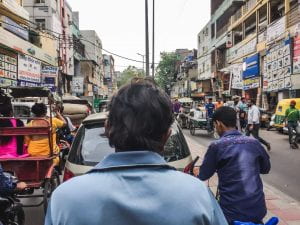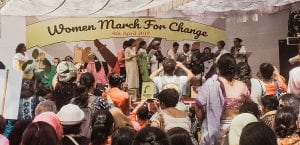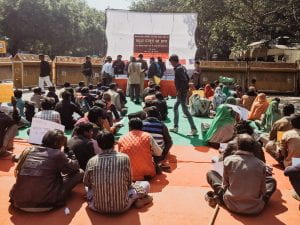By Pankhuri Agarwal
Fieldwork research has a significant effect on one’s mental, emotional and physical well-being. However, it is astonishing that not much time, space and attention is devoted to exploring, learning and deliberating upon the variety of fieldwork experience that goes undocumented in academic work including on topics such as gender bias and mansplaining; nationality and cultural ethos as a researcher of particular origin; uncertainties, failures and long periods of waiting; emotional and mental harm to the researcher, to name a few.
I realised this more when I recently completed seven months of socio-legal multi-sited ethnographic fieldwork in Delhi and neighbouring states. The fieldwork broadly comprised of investigating the performance of Article 23 of the Constitution of India, ‘prohibition of traffic in human beings, begar and other similar forms of forced labour’ and its effect on the everyday lived experience of people (begar means non-payment of wages for work done). This entailed accompanying sex workers and bonded/forced labourers in their legal journeys as internal migrants (in various occupations) through various sites such as the courtrooms, police stations, prison, shelter homes, red light area, informal worksites and district and central government offices. I conducted in-depth interviews with sex workers and bonded/forced labourers, besides interviews with related legal stakeholders. These interviews were complemented with courtroom observation, participant observation and a study of legal case files, which captured the entirety of the participant’s long, unpredictable and complex legal journeys.

The process of following these movements through various sites meant that I often occupied multiple (assumed) positions and identities simultaneously – that of a researcher, female friend, student, journalist, lawyer, intern and so on. This also implied that I was seen in the light of multiple assumptions in terms of my class, caste, occupation, marital status and age. Whilst the fieldwork was filled with many positive experiences due to the support and encouragement of comrades and activist organisations, in this article I want to focus on the gender bias and emotional burden the fieldwork demanded of me as an ‘Indian female researcher’.
Several researchers before me have taken the responsibility of writing about how their gender, age, caste, nationality, class or their very being were put into question while doing fieldwork (see Ravina Aggarwal, Elizabeth Chacko, Isabelle Kunze and Martina Padmanabhan Erdkunde, Isabella Ng, Nitasha Sharma and Jillian M. Rickly among others). This is because as a female researcher, one can be constantly put off by enquiries and curiosities surrounding one’s marital status, age, race, caste, class or clothing. It is often assumed that the researcher is unaware, innocent or naive. Dressing ‘maturely’ does not help either. When I interviewed some elite male participants, they (ignoring my questions) started by offering me basic definitions of terms and concepts that I did not even ask for. On some occasions, I was stopped with an angry hand gesture (while I was talking) and, in a very aggressive tone, ‘Stop talking; listen to me first’. This was even though I had explained that I had worked on and researched these issues for over six years.
This is not surprising especially when we know that power relations, gender violence and hierarchy are embedded in the soul and spirit of Indian society. We are a society built and sustained on the robust, unshaken and eternal foundation of patriarchy. Amidst this, the intellectual work, emotional labour and the mental health effects of such experiences go unnoticed, let alone compensated for. It is generally accepted and internalised that women, especially feminist women invite such reactions. And you alone are responsible for them. ‘You must have done something’, people say, or, ‘Just ignore it; you think too much’.

I also realised that in the field, people (in both personal and professional relationships) were less concerned about my research and well-being than with the roles I should be playing as a woman. I was expected to be ‘back home’. I wondered what for. ‘You should not take up such fieldwork travels while [your partner] is left alone at home.’ These accusations were followed up with solutions. ‘You do not have to travel. How will you travel? We will arrange for a ten-minute phone call and you can write that you interviewed this person. This will make the fieldwork quicker and you can return soon.’
I often pondered upon such encounters and noted them in my reflection journal. Where am I supposed to return? To who and why? Why this rush and pressure? Why was my mobility between fieldwork sites a matter of concern and curiosity to some people? Why was there no interest in my research or the emotional roller coaster I was going through in the field? The mystery of my return concerned and perturbed many people in the field. Due to this, I was constantly called to account for myself, not as a researcher, but because of my position as a woman with a partner. My identity was constantly attached to his as if I did not exist as an individual. This was overwhelming not only for me but also for my partner because, in these conversations, he was made an implicit participant without consent.
Once such distressing encounters had become a usual occurrence, I mastered the poker face. I needed to collect data and could not risk annoying anyone. So, I laughed when they laughed, expressed concern when they did, shook my head often as they did and in rare instances, gave a ‘shy woman-like smile’ when ‘uncomfortable topics’ were discussed, as was expected of a woman from a ‘good family’. If I did not, they stared. So, I did.
During such emotionally troubling times, fortunately, I had some comforting companions. My supervisor shared with me her own fieldwork experience of ‘mansplaining’. This encouraged me to reflect on my experience of fieldwork as a feminist woman with those of the female participants of my research; how different yet similar our lives are in terms of how we all ‘risked lives, homes, relationships, in the struggle for more bearable worlds’ (Ahmed, 2017, p.1). The subaltern resists, speaks and revolts invisibly and powerfully, even in the middle of moving, parting from their land and homes, and often their families and children. How powerful, beautiful and empowering is this!

I also found comfort in Maya Angelou’s autobiography where she, through her brilliant and unapologetic writing, stumbles through life from one role to another both personally and professionally, fighting and discovering the multiple ways in which women are not only made to feel small and incompetent but are often treated as second-class citizens. They are expected to fit into many roles and stereotypes and made to feel guilty if they do not follow the norm. Maya Angelou was speaking to me, ‘Onus and guilt were shifting into my lap, where they surely didn’t belong’ (2008, p.246).
Amidst these reflections, Sara Ahmed gave me the reassurance to not ignore, give in and ‘adjust in an unjust world’ (2017, p.84) (emphasis my own). I then realised that the politics of fieldwork research was gradually merging with my feminism(s). The personal was indeed political and the political became personal. This transported with it the (un)comfortable consciousness of my being, beyond that of a researcher and a woman. These musings kept visiting me because of how I was seen and how I was not seen during fieldwork. This is even though I have spent more than 28 years growing up in India, being accustomed to conducting myself in an ‘appropriate manner’ in both public and private spaces, not because I want to but because I need to. I know and have experienced that speaking up does not always help. It often leads to accusations of creating an ‘unnecessary scene’. ‘To disappoint an expectation is to become a disappointment’ (Ahmed, 2017, p.52). So, in a society where people are accepted, rewarded and applauded for being sexist, casteist and misogynistic, bringing out wrong can often make you the reason for the wrong. How shocking is this revelation? Not at all.
I am sure that these experiences resonate with some other researchers and require space, time and attention for ‘revelation’. For this reason, I am organising a series of (three) seminars with the MMB Networking Funds Grant between January and June 2020 at the University of Bristol for PhDs and ECRs. Each seminar will have a specific theme around fieldwork research. These seminars will be followed with a writing workshop where experienced researchers from across disciplines will be invited to mentor PhDs and ECRs to bring this important discussion together in an edited volume, report or podcasts. If you would like more information about the seminars and the writing workshop, please e-mail me at pankhuri.agarwal@bristol.ac.uk.
Pankhuri Agarwal is a PhD Researcher in the School of Sociology, Politics and International Studies at the University of Bristol.

